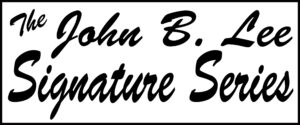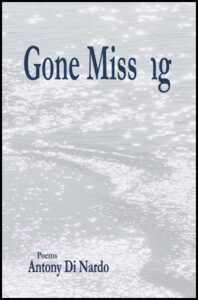Author: Antony Di Nardo
Title: GONE / M I S S N G
ISBN: 978-1-989786-04-8 = 9781989786048
Trade Paperback: 106 pages – 6 X 9
Suggested Retail (Paperback): $19.95
E-Stores: Amazon, Barnes & Nobel, Indigo and other e-stores worldwide.
Be sure to check each e-store for the best price on book and shipping as prices tend to vary a lot from e-store to e-store
Local Store: Contact your local bookstore. They will order the book for you – direct them to Hidden Brook Press with the title and ISBN.
Free Reviewer Copy: If you are going to publish a review in a Newspaper or Magazine we will send you a free copy. If you are going to publish a review on your Website or Blog we can offer you a copy at 50% discount.
We are proud to announce that this book is part of “The John B. Lee Signature Series”.
Blurbs:
31 Words
In Gone Missng, Di Nardo’s language has a mind of its own. He writes “accuracy and algorithms are not for poets … a poet just gets lucky and finds what’s missing.”
60 Words
Di Nardo’s Gone Missng explores rituals of loss and “things that don’t belong” with clarity and wit in poetry that revels in the absurd. These are poems that renew the plain and simple with imagery that surprises as well as juxtaposes the mundane to the ecstatic. They are simply fine poems that you will want to read more than once.
157 Words
Antony Di Nardo’s fifth collection of poetry confronts questions of whether what goes missing is gone for good and what it means to be immortalized. Rituals of loss are explored and iterated. Our vain dismissal of the natural world as something that exists apart from us is put on hold. Regardless how dire, there is no lack of wit or humour in these poems. His language has a mind of its own. He writes “accuracy and algorithms are not for poets/… a poet just gets lucky and finds what’s missing.” GONE MISSNG is also a survey of “things that don’t belong,” steeped in language that surprises as well as juxtaposes the mundane to the ecstatic. Di Nardo’s poetry might revel in the absurd, but it is as essential as seeing without eyes, poems “incumbent on/what reveals/the earth …” These are poems that renew the plain and simple with imagery that sticks like Velcro to mind and memory.
379 Words
Antony Di Nardo’s fifth collection of poetry confronts the question of whether what goes missing is gone for good and what it means to be kept alive in memory. In the opening poem “a letter sits unwritten/forgotten on the desk” stretching the limits of good intentions and the absurdity of paradox. His poetry has a way of doing that, of stretching limitations. The surreal sits side by side with the mundane. Rituals of loss that humans readily accept, as well as our vain dismissal of the natural world as something that exists apart from us, surface in these poems. If the aesthetics of Di Nardo’s writing suggest a bizarre and outlandish reality of norms, it is because he agrees with Borzutsky that “we do not understand why we do not understand why we will die.” But dire as this may sound, there is no lack of humour or of wit, of the wry and sardonic, in these buoyant, broken lines. His language has a mind of its own. In “Rabbit’s Foot” he tells us “accuracy and algorithms are not for poets/those look good on some but most of the time/a poet just gets lucky and finds what’s missing.” The long-poem suite, “Gone: the dead Susan poems,” pays tribute to a dear friend and poet in the language of absence, invoking the ghost of Yorick and the imagery of detachment. “I bore a poem in my head/I bore a casket for a poet” he writes, and for a little while the poet goes graveside. But not for long. GONE MISSNG is also an exploration of things that don’t belong: “a lonely plastic bag” swims among the rocks and “plastic pelts” wash up on a beach in imagery that surprises as well as juxtaposes the quotidian to the ecstatic. Drawing from a variety of forms, Di Nardo plies the broken line with deft and clarity. His poetry might revel in the absurd, but at its best it is elemental, and as essential as what we see without eyes, poems “incumbent on/what reveals/the earth//the things/we cling to.” There is no time for nonsense in this book, but ample space for an immersive experience in a poetry that renews the plain and simple with imagery that sticks like Velcro to mind and memory.




